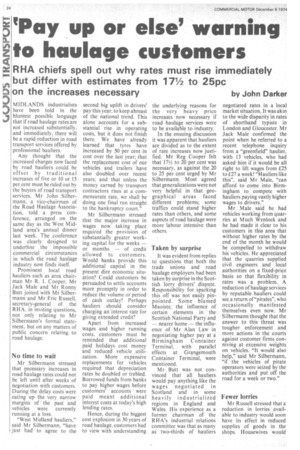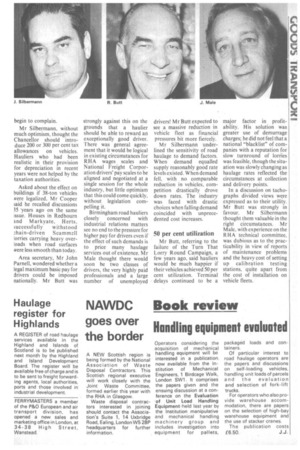'Pay up or else' warning to haulage customers
Page 26

Page 27

If you've noticed an error in this article please click here to report it so we can fix it.
RHA chiefs spell out why rates must rise immediately but differ with estimates from 171/2 to 25pc on the increases necessary by John Darker MIDLANDS industrialists have been told in the bluntest possible language that if road haulage rates are not increased substantially, and immediately, there will be a rapid reduction in road transport services offered by professional hauliers, Any thought that the increased charges now faced by road hauliers could be offset by traditional increases of five or 10 or 15 per cent must be ruled out by the buyers of road transport services, Mr John Silbermann, a vice-chairman of the Road Haulage Association, told a press conference, arranged on the same day as the West M idland area's annual dinner last week. The conference was clearly designed to underline the impossible commercial circumstances in which the road haulage industry now finds itself.
Prominent local road hauliers such as area chairman Mr R. I. Cooper, Mr Jack Male and Mr Ronny Butt joined with Mr Silbermann and Mr Eric Russell, secretary-general of the RH A, in inviting questions, not only relating to Mr Silbermann's formal statement, but on any matters of public concern relating to road haulage.
No time to wait
Mr Silbermann stressed that pecessary increases in road haulage rates could not be left until after weeks of negotiation with customers. During the delay costs were eating up the very narrow margins of the past and vehicles were currently running at a loss.
"West Midland hauliers," said Mr Silbermann, "have Just had to agree to the second big uplift in drivers' pay this year, to keep abreast of the national trend. This alone accounts for a substantial rise in operating costs, but it does not finish there. We have already learned that tyres have increased by 50 per cent in cost over the last year; that the replacement cost of our vehicles and trailers have also doubled over recent years; and that unless the money earned by transport contractors rises at a commensurate rate, we shall be doing one final run straight to the bankruptcy court."
Mr Silbermann stressed that the major increase in wages now taking place required the provision of substantially greater working capital for the weeks — or months — of credit allowed to customers. Would banks provide this additional capital in the present dire economic situation? Could customers be persuaded to settle accounts more promptly in order to reduce the volume or period of cash outlay? Perhaps hauliers should consider charging an interest rate for giving extended credit?
Apart from increased wages and higher running costs, customers must be reminded that additional paid holidays cost money and reduced vehicle .utilization. More expensive replacements for vehicles required that depreciation rates be doubled or trebled. Borrowed funds from banks to pay higher wages before customers' accounts were paid meant additional interest costs at today's high lending rates.
Hence, during the biggest cost explosion in 30 years of road haulage, customers had to view with understanding the underlying reasons for the very heavy price increases now necessary if road haulage services were to be available to industry.
• In the ensuing discussion it was apparent that hauliers are divided as to the extent of rate increases now justified. Mr Reg Cooper felt that 171,4 to 20 per cent was necessary, as against the 20 to 25 per cent urged by Mr Silbermann. Most agreed that generalizations were not very helpful in that geographical areas faced different problems; some traffics could stand higher rates than others, and some aspects of road haulage were more labour intensive than others.
Taken by surprise
It was evident from replies to questions that both the trade unions and road haulage employers had been taken by surprise in the Scottish lorry drivers' dispute. Responsibility for sparking this off was not easily pinpointed. Some blamed Maoists; the influence of certain elements in the Scottish National Party and — nearer home — the influence of Mr Alan Law in negotiating higher pay at a Birmingham Container Terminal, with parallel effects at Grangemouth Container Terminal, were mentioned.
Mr Butt was not convinced that all hauliers would pay anything like the wages negotiated in Scotland and in some heavily industrialized regions in England and Wales. His experience as a former chairman ot the R H A's industrial relations committee was that as many as two-thirds of hauliers negotiated rates in a local market situation. It was akin to the wide disparity in rates of shorthand typists in London and Gloucester. Mr Jack Male confirmed the point when he referred to a recent telephone inquiry from a "greenfield" haulier, with 13 vehicles, who had asked him if it would be all right to lift wages from £25 to £27 a week! "Hauliers like this", said Mr Male, "can afford to come into Birmingham to compete with hauliers paying vastly higher wages to drivers."
Mr Male said he had vehicles working from quarries at Much Wenlock and he had made it clear to his customers in this area that without higher rates by the end of the month he would be compelled to withdraw hi g vehicles. He appreciated that the quarries supplied civil engineers and• local authorities on a fixed-price basis so that flexibility in rates was a problem. A reduction of haulage services by reputable hauliers could see,a return of "pirates", who occasionally manifested themselves even now. Mr Silbermann thought that the answer to this threat was tougher enforcement and more actions in the courts against customer firms conniving at excessive weights on vehicles. "It would also help," said Mr Silbermann, "if the vehicles of pirate operators were seized by the authorities and put off the road for a week or two."
Fewer lorries
Mr Russell stressed that a reduction in lorries available to industry would soon have its effect in reduced supplies of goods in the shops. Housewives would begin to complain.
Mr Silbermann, without much optimism, thought the Chancellor should introduce 200 or 300 per cent tax allowances on vehicles. Hauliers who had been realistic in their provision for depreciation in recent years were not helped by the taxation authorities.
Asked about the effect on buildings if 38-ton vehicles were legalized, Mr Cooper ;aid he recalled discussions 35 -years ago on the same Lssue. Houses in Redbourn md Markvate, Herts,
;uccessfully withstood .ihain-driven Scammell lorries carrying heavy overloads when road surfaces were less smooth than today.
Area secretary, Mr John Parnell, wondered whether a legal maximum basic pay for drivers could be imposed nationally. Mr Butt was strongly against this on the grounds that a haulier should be able to reward an exceptionally good driver. There was general agreement that it would be logical in existing circumstances for RHA wages scales and National Freight Corporation drivers' pay scales to be aligned and negotiated at a single session for the whole industry, but little optimism that this could come quickly, without legislation compelling it.
Birmingham road hauliers closely concerned with industrial relations matters see no end to the pressure for higher pay for drivers even if the effect of such demands is to price many haulage services out of existence. Mr Male thought there would soon be two classes of drivers, the very highly paid professionals and a large number of unemployed drivers! Mr Butt expected to see a massive reduction in vehicle fleet as financial pressures bit more fiercely.
Mr Silbermann underlined the sensitivity of road haulage to demand factors. When demand equalled supply reasonably good rate levels existed. When demand fell, with no comparable reduction in vehicles, competition drastically drove down rates. The industry was faced with drastic choices when falling demand coincided with unprecedented cost increases.
50 per cent utilization
Mr Butt, referring to the failure of the Turn That Lorry Round Campaign, a few years ago, said hauliers would be much happier if their vehicles achieved 50 per cent utilization. Terminal delays continued to be a major factor in profitability. His solution was greater use of demurrage charges; he did not feel that a national "blacklist" of companies with a reputation for slow turnround of lorries was feasible, though the situation was slowly changing as haulage rates reflected the circumstances at collection and delivery points.
In a discussion on tachographs divided views were expressed as to their utility. Mr Butt was strongly in favour. Mr Silberrnann thought them valuable in the right circumstances. Mr Male, with experience on the RHA technical committee, was dubious as to the practicability in view of reports of maintenance problems and the heavy cost of setting up calibration testing stations, quite apart from the cost of installation on vehicle fleets.












































































































































